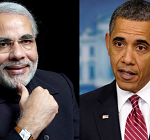India’s new prime minister, Narendra Modi, surprised many by inviting SAARC leaders to his swearing-in ceremony on 25 May. His invitation put neighbourhood politics on a more positive trajectory. Now, Modi has once again surprised everyone by the promptness with which he accepted President Barack Obama’s invitation to visit Washington D.C. after attending the United Nations General Assembly in New York in September. By doing this, he has reaffirmed his reputation for pragmatism and implicitly declared that foreign policy will be as important as his government’s economic agenda.
Even though the U.S. is perceived to be losing its relative dominance in global affairs to the challenge from a rising China demanding “a new type of great power relationship,” India has much to gain from a smoother India-U.S. equation. This is especially vital for us at a time when American announcements pertaining to Afghanistan, China and Russia are reordering the strategic configurations in South Asia, the Asia Pacific, and Europe.
For India, defence trade and production relations, access to high technology, and smooth interactions with the Indian-origin community of over 3 million in the U.S., all require and simultaneously promote warmth in the relationship. The U.S. too has frequently expressed its desire to work closely with India in the Indo Pacific and in South Asia.
In a major foreign policy address on May 28 at an American military academy, President Obama announced plans to leave 9,800 troops in Afghanistan at the end of this year, with a view to recalling them all by the end of 2016. Although the U.S. frequently expresses the hope that India will contribute to ensuring stability in Afghanistan, there does not seem to have been any prior consultation on this matter with the Modi government, or with Afghan president Hamid Karzai or his yet to be elected successor.
Secondly, and more portentously, the U.S. has announced the swap of five high-value prisoners from Guantanamo Bay for the safe return of Sergeant Bowe Bergdahl, held by the Taliban for the last five years. The deal, bitterly criticised by the Karzai government, contravenes American assertions, and indeed a global consensus, that negotiations with terrorists are off the table. For the Afghans, the deal is reminiscent of 1992 when the Taliban—itself a creation of the U.S. and Pakistan’s intelligence agencies—captured power in Kabul and instated a brutal regime.
In the past, turbulence in Afghanistan has increased India’s vulnerability to terrorism as Pakistan has sought to dominate Kabul and channelled terrorist activities towards India in pursuit of its objectives in Jammu and Kashmir. Although the U.S. is now more willing to accept the duplicity with which Pakistan has acted in demanding American aid while thwarting its operations against terrorists in Afghanistan, this has not yet translated into closer coordination with India.
Despite the U.S.’s continuing ambivalence, the Modi government must pursue this closer coordination in order to restrain Pakistan’s interference in Afghanistan and to persuade the West to fulfil its economic commitments to keep the Afghan economy afloat.
To India’s east, at the Shangri-La Dialogue, an important security forum in Singapore this week, the U.S. criticised destabilising Chinese actions in the disputed islands in the South China Sea, warning that the U.S. will “firmly oppose any nation’s use of intimidation, coercion, or the threat of force to assert those [territorial] claims.” Obama had held out similar assurances during his visits to Japan and the Philippines last month.
However, there has been no increase in deployments in the region; the U.S. has enormous economic dependencies in China, which restrain its freedom to act. India has its own border dispute with China. Although largely peaceful, the number of incursions by Chinese troops has been increasing, and India has to craft a response within its larger policy of continuing talks and simultaneously expanding trade.
East Asia is not the only region where the U.S.’s allies are looking for more than words. In his ongoing visit to Europe to participate in the 70th anniversary of the D-Day landings in Normandy, Obama announced a European Reassurance Initiative worth $1 billion, and said the U.S. will supplement the deployment of 150 troops and a dozen F16 aircraft in Poland.
So disturbed are former Soviet bloc countries by events in Ukraine, particularly the annexation of Crimea by Russia, that even this meagre gesture by Obama has been momentarily welcomed.
These various global transformations have so far yielded more instability than positive change, even for countries like India, which would prefer a more equitable world order to evolve.
In this context, Modi’s forthcoming interactions on the global stage—including a probable visit to Japan, meetings with the Russian and Chinese presidents at the BRICS summit in Brazil in July, a possible stopover in Germany, and the meeting with the U.S. president in September—are opportunities for the prime minister to put India at the centre of this rapidly changing international power matrix. As a politically stable rising power with a clearly articulated economic agenda, India is well suited for this role.
Neelam Deo is Co-founder and Director, Gateway House: Indian Council on Global Relations; She has been the Indian Ambassador to Denmark and Ivory Coast; and former Consul General in New York.
This article was exclusively written for Gateway House: Indian Council on Global Relations. You can read more exclusive content here.
For interview requests with the author, or for permission to republish, please contact outreach@gatewayhouse.in.
© Copyright 2014 Gateway House: Indian Council on Global Relations. All rights reserved. Any unauthorized copying or reproduction is strictly prohibited


